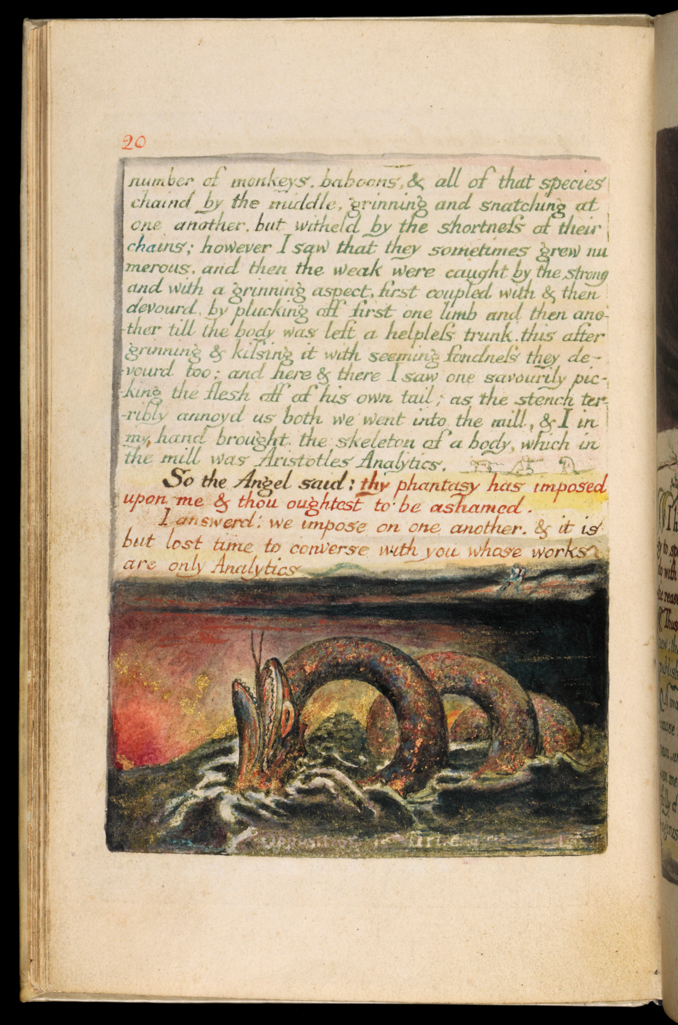Songs of Innocence (E 16)
Infant Joy
"Sweet Joy Befall Thee"
Besides his well known (to Blake students), A Blake Dictionary, S. Foster Damon wrote William Blake: His Philosophy and Symbols, which also has much to teach about Blake's poetry and how it can be understood. This quote about various levels of meaning which the symbol can represent is found on page 65.
"Practically the whole existence of poetry consists of imposing of human values on natural objects...
Symbolism is the recognition and fixation of these values. It is the highest form of that process usually performed by the weaker metaphor and the still weaker simile. The simile states a resemblance, the metaphor states an identity, and the symbol assumes the identity without direct statement. In the first case love would be likened to a rose; in the second case, Love would be called a rose; in the third, the Rose would appear unexplained. There is a still higher rung in this Jacob's Ladder: the rung popularly known as Prophecy. Here the Rose would indicate some particular act in the past, present, or future. A specific temporal significance is thus imposed upon the Symbol, which hitherto dealt with Eternities...
Let us return , then, to the symbol. Blake, of course, knew perfectly well what he was doing. He deliberately interpreted objects to show their relation to, and their expression of, mankind. Everything he saw revealed to him its inner essence, which was in turn the revelation of a truth. Only through this method could Truth be approached. Isis cannot be seen unveiled, for the mortal eye itself is her vesture. The great secrets cannot be told; the very syllables are their mask....
And thus we learn a strange fact: that the clearer, the more precise, Blake's writings become, the more obscure they seem. The trouble is not with Blake, it lies in our own inability to understand. The fires of Hell still seem like torment and insanity to us, the Angels. Therefore Blake cried so fiercely: 'Go! put off Holiness, and put on Intellect!' "
It is not difficult to find passages in Blake to illustrate the use of the symbol to reveal multiple layers of psychological, poetic and spiritual meanings. How does this speak to you?
Four Zoas, Night VIII, Page 113-114, (E 384)
[Enion speaking:]
"Listen: I will tell you what is done in the caverns of the grave
the lamb of God has rent the veil of mystery
When the mortal disappears in improved knowledge cast away
The former things so shall the Mortal gently fade away
And so become invisible to those who still remain
Listen I will tell thee what is done in the caverns of the grave
The Lamb of God has rent the Veil of Mystery soon to return
In Clouds & Fires around the rock & the Mysterious tree
As the seed waits Eagerly watching for its flower & fruit
Anxious its little soul looks out into the clear expanse
To see if hungry winds are abroad with their invisible army
So Man looks out in tree & herb & fish & bird & beast
Collecting up the scatterd portions of his immortal body
Into the Elemental forms of every thing that grows
He tries the sullen north wind riding on its angry furrows
The sultry south when the sun rises & the angry east
When the sun sets when the clods harden & the cattle stand
Drooping & the birds hide in their silent nests. he stores his thoughts
As in a store house in his memory he regulates the forms
Of all beneath & all above & in the gentle West
Reposes where the Suns heat dwells he rises to the Sun
And to the Planets of the Night & to the stars that gild
The Zodiac & the stars that sullen stand to north & south
He touches the remotest pole & in the Center weeps
That Man should Labour & sorrow & learn & forget & return
To the dark valley whence he came to begin his labours anew
In pain he sighs in pain he labours in his universe
Screaming in birds over the deep & howling in the Wolf
Over the slain & moaning in the cattle & in the winds
And weeping over Orc & Urizen in clouds & flaming fires
And in the cries of birth & in the groans of death his voice
Is heard throughout the Universe whereever a grass grows
Or a leaf buds The Eternal Man is seen is heard is felt
And all his Sorrows till he reassumes his ancient bliss"
This is symbolic language at its finest; not allegory, simile or metaphor but living symbols which may enter the Soul of Man: an opportunity to collect the 'scattered portions of [our] immortal bodies.'
First posted May 2010.

.jpg)

